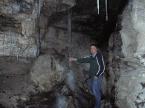Information
Dej (Hungarian: Dés; German: Desch) is a city in northwestern Romania, 60 km north of Cluj-Napoca, in Cluj County. It lies where the river Someşul Mic meets the river Someşul Mare.
Dej is the crossroads of important railroads and highways linking it to Cluj-Napoca, Baia Mare, Satu Mare, Deda, Bistriţa, and Vatra Dornei.
It is an old salt mining town built on a hilly ground. The first documents attesting the existence of this city goes back to 1061 and 1214. Strategic importance and massive salt reserves were found from Roman times. The Dej fortress was built sometime around 1214 to 1235.
King Andrew II of Hungary <!-- (1205-1235)--> raised Dés to the privileged status of a free royal town. In 1241 the city was invaded by Tartars. The old mines were exhausted by 1717; the new mines are still in operation today. Some of the galleries of the salt mine are believed to be more than 15 kilometers long. The population of Dej used to be the Transylvanian Saxons, who were settled here from Germany, but during the centuries their number decreased.
Dej, like many other towns in Transylvania, suffered many times during history. In 1638, Dej was the site for the huge show trial staged against the members of the Sabbath (Hung. Szombatosok), a sect formed during the Protestant movement, during which they were sentenced to death with full confiscation of property. The sentencing was in Beszterce (Bistriţa). In 1717, an attack by the Tartars of Crimea struck Dej.
From 1918 to 1920 Dej was capital of the Szolnok-Doboka County; from 1920 to 1940, capital of the Someş County.
The landscape is dominated by the impressive building of the Hungarian Reformed Church, built in the second half of the 15th century. The church has Gothic elements carved in stone. The tower is 72 meters high and the fortifying walls were erected in the 16th century. Sadly, they were torn down during a renovation in the 1880's. In Dej the Franciscan order had a monastery and their style can be recognized in the long and narrow apse of the church.
Other sites: the "Dr. Teodor Mihaly" and "Dr. Alexandru Vaida-Voevod" memorial houses, and the Ocna Dej salt mine, said to be well suited for the treatment of locomotor system diseases, asthenia, debility and rachitis.
Cluj
CountyMunicipalities of RomaniaTransylvania

 English
English









